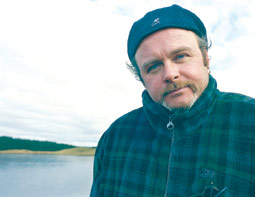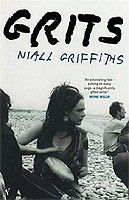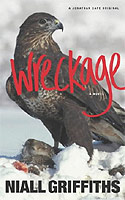
| HOME |
| NERVE |
| REVIEWS |
| ARCHIVE |
| EVENTS |
| LINKS |
| ABOUT US |
| CONTRIBUTORS |
| BACK ISSUES |
| CONTACT US |
Back to index of Nerve 8 - Spring 2006
 Liverpool
is often noted as a city of writers, poets, songwriters and playwrights,
but few novelists. One man to go against the grain of this is Niall Griffiths.
His intense and often brutally dark novels, punctuated with an absurdist
sense of humour, tell the story of those existing, often forgotten, on
the edge of society.
Liverpool
is often noted as a city of writers, poets, songwriters and playwrights,
but few novelists. One man to go against the grain of this is Niall Griffiths.
His intense and often brutally dark novels, punctuated with an absurdist
sense of humour, tell the story of those existing, often forgotten, on
the edge of society.
Niall Griffiths Interview
By Kenn Taylor
Niall Griffiths’ books are written mostly in dialect, and set against the mixed background of the Welsh landscape and the Liverpool cityscape in all their glory and horror. Despite having written five novels, selling thousands of books, and having had his work translated into five languages he has received little recognition in the city of his birth; perhaps because of a mixture of the controversial subject matter of his books, and the fact that he now calls Aberystwyth his main home; he often visits the city however.
Niall was born in Wendell Street, Toxteth, later living in Netherley. He began writing at an early age, "basically since I had the motor function to pick up a pen." He was influenced early on by the oral tradition passed down from his Welsh-speaking grandparents. "There were not many books in the house but it was full of stories." But in a household lacking literature his early creations were often of a strange fantasy nature involving, amongst other things, giant crabs. He says: "Where it came from I have no idea, it's just always been there and it needs to come out. If I don't write for a day I feel like an absolute wretch, it's almost like, kind of having to justify my existence." He talks about being profoundly influenced by finding a book at the age of ten by Welsh dialect writer Ron Berry: "I think when I started to read books they gave me a way of dealing with a terribly confusing world. When you read, say for an hour, you're away from the world but you're also very much here, especially when you are reading very worthwhile literature, because it should be telling you about the world outside your window."
At the age of twelve his family emigrated to Australia, one of the 'Ten Pound Poms' that left the UK in their thousands; but due to the homesickness of his mum they returned three years later. With little money, having had to pay a full return fare, they were helped to find a house to rent by a relative in West Kirby, Wirral where Niall attended the local Caldy Grange Grammar School. He was often singled out and treated differently by some teachers because of his Liverpool background. He left school at 15 and went through a series of menial jobs including cleaning muck spreaders. Recalling: "I did a bit of work in any kind of job and all that taught me was I didn't want to do any kind of proper job. That's one of the reasons I returned to study." He attended the now defunct Birkenhead Technical College to study for A-Levels. Later he moved back to Liverpool, living in Hope Street and various other spots. "I was just bumming around the city till I was twenty-two and left to study. I've travelled around Britain ever since; I've always come back though and it always feels like home."
He finally settled in Aberystwyth, returning to his family's roots in Wales. He first fell in love with the place when as a teenager he was sent to Snowdonia on an outward-bound course; sent by a judge after a series of petty crimes. This much-maligned policy actually seems to have had the desired effect on Niall: "It showed me how silly I had been and it gave me a creative outlet for my energies." And it instilled a love in him which remains to this day: "I love climbing, well, walking up. On top of a mountain is such an amazing place to be. It's almost like being close to God in a way, especially if you are on your own. Incredible! That said, it's fucking brutal as well. Nature, birds of prey, full of death. Living in the country isn't very nice. You leave your house and walk down to the shops and it's all very pretty looking around but you look down and there's an animal torn apart. I wanted to capture that side of nature in my books too."
 His first
novel 'Grits', published in 2000, is about the flotsam and jetsam of the
UK washing up at the end of the railway line in Aberystwyth; trying to
escape their problems but only taking them with them. Well received both
critically and commercially he recalls: "I got all kinds of people
at my readings, people in cravats and people with facial tattoos."
His next book, the provocatively-titled 'Sheepshagger', deals with a disturbed
Welsh anti-hero Ianto's struggle to deal with his identity after his family
home is bought by incomers, with murderous consequences. Perhaps his most
'Welsh' book was, ironically, mostly written while staying in his girlfriend's
flat on the edge of Toxteth. His last three books have either been set
in Liverpool or covered characters that, like Niall and many others, have
made the journey between the city and Wales. 'Kelly + Victor' is an intense
tale of the extremes of love and life in Liverpool at the turn of the
millennium, while both 'Stump' and his latest, 'Wreckage', deal with a
wide cast of characters living and dying at the lower end of society's
ladder in both the city and the countryside.
His first
novel 'Grits', published in 2000, is about the flotsam and jetsam of the
UK washing up at the end of the railway line in Aberystwyth; trying to
escape their problems but only taking them with them. Well received both
critically and commercially he recalls: "I got all kinds of people
at my readings, people in cravats and people with facial tattoos."
His next book, the provocatively-titled 'Sheepshagger', deals with a disturbed
Welsh anti-hero Ianto's struggle to deal with his identity after his family
home is bought by incomers, with murderous consequences. Perhaps his most
'Welsh' book was, ironically, mostly written while staying in his girlfriend's
flat on the edge of Toxteth. His last three books have either been set
in Liverpool or covered characters that, like Niall and many others, have
made the journey between the city and Wales. 'Kelly + Victor' is an intense
tale of the extremes of love and life in Liverpool at the turn of the
millennium, while both 'Stump' and his latest, 'Wreckage', deal with a
wide cast of characters living and dying at the lower end of society's
ladder in both the city and the countryside.
He is currently working on two non-fiction books both dealing with places he has lived in. One is about the 'Ten Pound Poms' immigration system that his family went through. He has now also been commissioned to write a book about the 'Real Liverpool', published by an independent Welsh press that previously commissioned him to write a book on the 'Real Aberystwyth', as part of a series of honest portrayals of places in Wales. The company has now turned its attention to English cities with a strong Welsh connection and so approached Niall about writing on Liverpool. Because of this he is planning to move back to the city for a period of time this year to get to know the city once more and look at the massive changes that are currently taking place. He says: "Writing a book about the real Aberystwyth was one thing, it's a town of 20,000 people but with Liverpool, I mean, where the fuck do you start?"
 We talk
about the connections between Liverpool and Wales, an issue examined extensively
in 'Wreckage'. He says: "I've started to explore those connections.
I mean, Liverpool has always been called the capital of North Wales. For
a lot of people there, Cardiff is a foreign city, it was Liverpool that
was their city." In the light of the Capital of Culture win, Liverpool
bidded to host some of the events of the national Eisteddfod, Liverpool
being one of the few places the festival has been held outside Wales in
the past. But this was met with fierce opposition from many different
quarters in Wales. I ask Niall his thoughts: "I think that is ignoring
the Welsh heritage in the city. You did have one of what they call the
arch druids coming on the local news going 'No it's a Saesneg city', ['Saesneg'
is Welsh derogatory slang for the English], which to me is just fucking
bigoted."
We talk
about the connections between Liverpool and Wales, an issue examined extensively
in 'Wreckage'. He says: "I've started to explore those connections.
I mean, Liverpool has always been called the capital of North Wales. For
a lot of people there, Cardiff is a foreign city, it was Liverpool that
was their city." In the light of the Capital of Culture win, Liverpool
bidded to host some of the events of the national Eisteddfod, Liverpool
being one of the few places the festival has been held outside Wales in
the past. But this was met with fierce opposition from many different
quarters in Wales. I ask Niall his thoughts: "I think that is ignoring
the Welsh heritage in the city. You did have one of what they call the
arch druids coming on the local news going 'No it's a Saesneg city', ['Saesneg'
is Welsh derogatory slang for the English], which to me is just fucking
bigoted."
I ask him his views on the Capital of Culture win for Liverpool: "Well it's a double-edged sword isn't it? It will bring money into the city but only if it will make money back for those who invest.” He recalls a conversation with the Glaswegian writer James Kelman about that city's win of Capital of Culture status in 1990. "James said it brought in a load of money, but since then the social problems in the city have only got worse, because the so-called scummy people got pushed out to the estates which never got cleaned up." He continues: "Culture, of course, is not just art galleries and restaurants, it's also graffiti and terrace chants and a lot of people forget the grassroots bands, independent publishing presses and everything. They want to focus on culture that is acceptable and saleable, the kind of stuff they talk about on the fucking Late Review." But he does not think the situation is all bad: "I don't think it will make this kind of hidden culture die down though. It should become stronger to react against it. You just want this sort of stuff to be recognised sometimes you know, but we would be foolish to expect anything more from this sort of scheme."
Niall has been noted and praised for writing against the now perceived norm that a pared down, economical writing style is best. He instead mixes the dialogue of different dialects with classical techniques and often highly charged, poetic prose. I ask him why: "In terms of dialect, and this is something that I have got from the Welsh, is that their politics and identity is all bound up in their voice, the Welsh language and accent. So I have kind of taken that and looked at all the politics bound up in language and how you speak. In terms of using classical devices I want to cite the stories of local, often poor people; voices that are often not heard. I wanted to give it an epic quality, the one it deserved and one way of doing that is to look back at epic writing."
His characters often seem to be searching, desiring and fighting for something that they can never quite get hold of. I ask him why: "I think we live in extreme times, certainly extreme psychological times. People are absolutely aching for things which are not there; for some kind of spiritual fulfillment. And if society does not offer any outlet for that it will come out in violence; it will come out in any form of extreme experience. So that's partly it but I suppose in another more powerful way people are just yearning for some sort of recognition." I ask him if this is why he, like his characters, has travelled so much: "If you have any kind of artistic ideas they are often linked with a sense of dissatisfaction, and you can think that it is because of where you are that you are dissatisfied and want to move out. That is often misguided of course, but sometimes it's the journey that counts, that's how you find yourself."
Despite winning two Welsh literary prizes he has received little recognition from the city he was born in, despite setting much of his work here. In a recent leaflet produced by the city council entitled 'Literary Liverpool', Niall's only mention was a sentence which he had to share with fellow local novelist Kevin Sampson, and they spelt his name wrong: 'Neil (Sic) Griffiths and Kevin Sampson write books about contemporary Liverpool'. This was after two pages about Willy Russell. I ask him if this bothers him: "Yeah I'm a bit disappointed. It would be nice to get some more recognition from the city, but then not all of my books have been set here, and of course I don't live there now, so I do understand in a way."
In addition to the 'Real Liverpool' and 'Ten Pound Poms' books Niall is working on a series of short stories, a novella, and is planning his next novel. I ask him of his previous works which is he most proud of: "'Grits' is very personal so in some way that's my favourite. In terms of pure structure 'Kelly + Victor'. I like 'Stump' too and 'Wreckage', that it’s so barely controlled...that's all my fuckin' books isn't it?" He continues: "In terms of favourites I suppose I hope I'm never happy, never write a masterpiece and keep writing. If I did I think I would probably wither away and die."
Niall's latest book Wreckage is available in Jonathan Cape paperback for £6.99
Printer friendly page